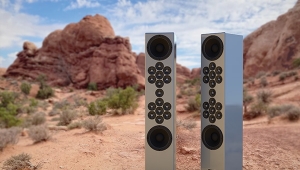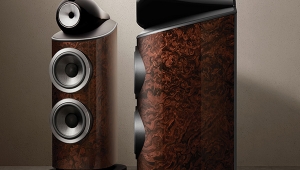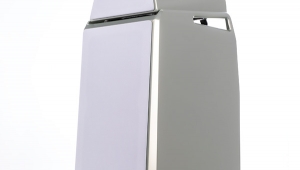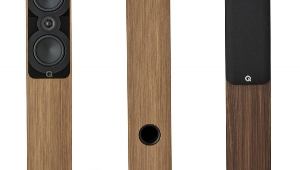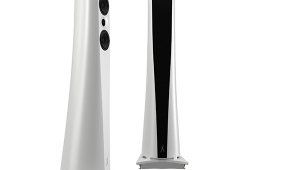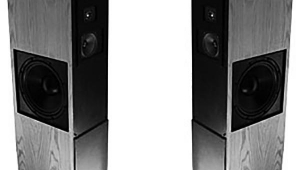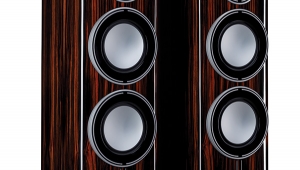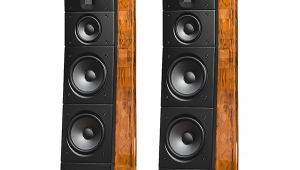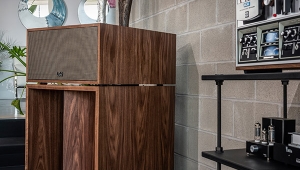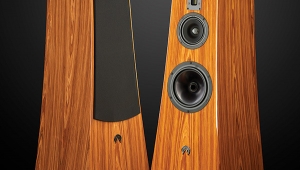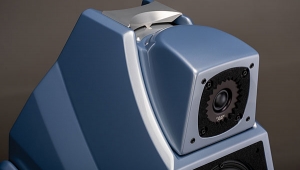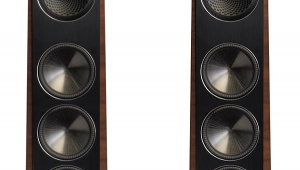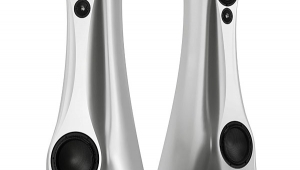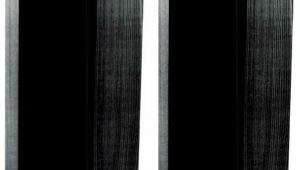| Columns Retired Columns & Blogs |
Thiel CS3.7 loudspeaker Page 2
To use John Atkinson's memorable phrase, the Thiel CS3.7 is a pig to drive. Wimpy amps need not apply—and by wimpy, I mean anything putting out less than 200Wpc. (Thiel recommends 100–600W.) Fortunately, I had the Ayre MX-R monoblocks (600W into a 4 ohms load) and the Musical Fidelity Nu-Vista 300 (480W into 4 ohms) on hand, so power was adequate.
Footnote 1: One of the crimes of the CD era is that Bebey's wonderful music doesn't seem to be available. It's weird, wonderful, accessible, life-affirming stuff, and we deserve access to it.
The '3.7s needed to be played hard—a lot—before they settled down. At first I found the sound opaque and borderland irritating, so before heading down to my office each day, I'd cue a CD, set the Ayre C-5xe universal player to Repeat, crank the preamp, and head off to work. By the following weekend, the improvement was remarkable.
Marry or burn
It might be fair to say that Thiel loudspeakers share a common sound: They're articulate and consistent over their frequency response, but they also tend toward a hyperarticulation that a less charitable listener might call brightness. The CS3.7 does not share that family trait. Oh, it's articulate all right, but it sounds relaxed as well. That coincidental tweeter-midrange is a genuine breakthrough for Jim Thiel.

Listening to "Flor de Azalia," from guitarist Phil Manzanera's The Manzanera Collection (CD, Blue Plate/Caroline 1798), I drowned in the sultry purr of Tania Libertad's voice. How warm! £Que dolor! Nope, not even the teensiest bit too much brightness. Jes' right.
But as I swayed entranced by the inner rhythms of Zacareas Gómez Urquiza's lyrics, I had another epiphany: The CS3.7 was a wizard at conveying subtle rhythmic information that more uptight, gringo-hipped loudspeakers just bulldozed through.
Some speakers send me searching for my rockingest music; some demand gentler treatment. The Thiels had me seeking out masters of subtlety. In "Vague/E la nave va," from the Anouar Brahem Trio's Le Voyage de Sahar (CD, ECM 1915), oudist Brahem is joined by pianist FranÁois Couturier and accordionist Jean-Louis Matinier, which is not a combination that I would have come up with—but Brahem is a genius and I am not. The soundscape is sparse, but the Thiels allowed me to hear so deeply into it that I could almost hear the three musicians listening to one another.
As Couturier plays arpeggios that ebb and flow, Matinier plays simple chords—he exhales them, if you will. Brahem enters on oud and Couturier echoes him, emphasizing some notes, merely following others. A conversation between oud and piano ensues. The song seems so simple, while also seeming profound—and the Thiels conveyed that passion and communication as well as I have ever heard it done.
At one point in "Vague," they scared the crap out of me. I was intently listening to the call and response between Brahem and Couturier when Matinier re-entered on accordion. I jumped and cursed—it was like having a stranger materialize in my living room.
Francis Bebey's "O Bia," from John Williams' Magic Box (SACD, Sony 89483), also illustrated the Thiels' way with subtle rhythms (footnote 1). It starts out as a shambling trio: guitar, bass, and a box. (I can never figure out—not even through the Thiels—if the drummer is slapping the box or rattling sand in it.) After laying out the theme, Williams puts the magic into the magic box he's playing, pushing some tempos, stretching out others. Jeff Buckley once told me that, with a guitar, you have an entire orchestra in your hands. Not I, perhaps, but Williams certainly does.
While the CS3.7 did swing "O Bia," it also revealed the speaker's one small shortcoming: the acoustic bass didn't have quite the impact it should have, especially in its bottom octave. Lightweight the CS3.7 isn't, but by the time you get down to 30Hz there's not a lot there.
My first "real" loudspeakers were Quad ESL-57s, so at a gut level, 30Hz still seems pretty low to me; I can be cavalier about missing bottom end that might be a deal-breaker for many listeners. That's why nothing beats auditioning speakers with an assortment of music that matters to you.
Choose not alone a mate
I briefly auditioned the Thiels while the Avalon Indras that I reviewed in October were still here. The two speakers were essentially cut from the same cloth—both had startling clarity and detail without the in-your-face quality usually implied by "detail." Like the Thiels, the Indras lack a sock-'em bottom end. Of course, the difference in price could buy the Thiels a pretty good subwoofer system. But shipping schedules kept the Indra/Thiel comparison brief, so I trotted out the trusty Wilson Audio WATT/Puppy 8 system, because it's such a known reference point for a compact high-quality monitor.
The title track of the Dave Holland Quartet's Conference of the Birds (CD, ECM 1027) perfectly illustrated one of the W/P8's greatest strengths: The speaker propels music forward through its bottom-end impact. With Holland's big acoustic bass setting the pace, the piece loped along splendidly, with Sam Rivers and Anthony Braxton chattering away on flutes and soprano saxophones (switching from one to the other as required), while Barry Altschul supplemented the sound as needed with trap set, chimes, gongs, and marimba. The Thiels did a good job of delivering all that harmonic complexity, but the Wilsons had the nod in the slam department—which also means they had better pace.
"A Chromatic Love Affair," from Duke Ellington's The Jaywalker (FLAC download, HDTracks), proved that low bass is important in establishing a sonic identity. It wasn't so much the acoustic bass that the Thiels scanted, it was also Paul Gonsalves' tenor-sax presence. The Thiels shrank Gonsalves a tad, robbing him of the stature he deserves. On the other hand, they did a superb job—every bit as good as the Wilsons—at resolving the inner voices of the woodwinds.
While the Wilsons did give Francois Couturier's piano in Brahem's "Vague/E la nave va" a slightly more vivid presence, I felt the Thiels did a better job of seeing into the heart of the music. What does that mean? It wasn't a matter of soundstaging or holographic imaging—both speakers were champs at that—but the Thiels had a quality I can describe only as grace. Grace is like a soap bubble: Try to dissect it and it's gone. Perhaps a better way of putting it would be that the Thiels got out of their own way, which is what a high-end speaker is supposed to do.
On Phil Manzanera's "Flor de Azalia," the Thiels flat-out seduced me. Tania Libertad's voice was so warm, so caressing, so fully fleshed—I melted. If you're a fan of the voice—any voice, but especially the female voice—you have got to hear these speakers:
Como espuma que inerte lleva el caudaloso reo
Flor de Azalea la vida en su avalancha te arrastró
pero al salvarte hallar pudiste protección y abrigo
donde curar tu corazón herido por el dolor
Oh my. Sighhhhh...
Marry in haste, repent at leisure
In our "Conclusions," we reviewers generally tend to natter, listing pluses and minuses and the price/value ratio, and basically saying that if you like this kind of thing, this is the thing you're going to like. I can't do that this time.
I loved, loved, loved the Thiel CS3.7. It's not perfect, but its major flaw is subtractive: not enough deep bass for many listeners. Well, that's easily fixed with a high-quality subwoofer, and Thiel makes some awfully good ones you could afford with what you save buying the Thiels instead of speakers costing two to three times as much—which is what I'd have to compare them with. That's not to say that $12,900 is cheap or a bargain. It's just to say that to find a speaker as good as the Thiel CS3.7, you'd have to spend more, and sometimes a lot more.
Also note: If your current receiver or amplifier puts out less than ... oh, let's be generous and say 150Wpc, you won't hear what the CS3.7 can do. It won't end well.
A Stereophile reader recently chided me for saying that "I could live with" a speaker. He observed that with speakers, like wives, the question isn't whether you can live with 'em, but whether you could live without 'em. If not, he said, ink the deal and live happily ever after.
I don't know how you'll answer that question, but I'm thinking I can't live without the Thiel CS3.7. It might be the speaker of my lifetime, too.
Footnote 1: One of the crimes of the CD era is that Bebey's wonderful music doesn't seem to be available. It's weird, wonderful, accessible, life-affirming stuff, and we deserve access to it.
- Log in or register to post comments
